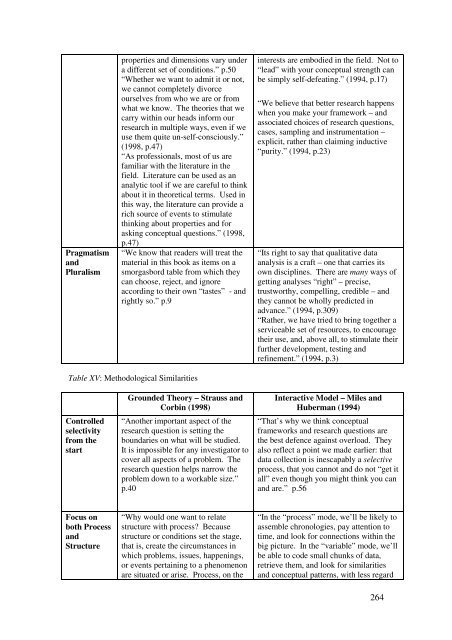DEVELOPMENTAL CRISIS IN EARLY ADULTHOOD: A ...
DEVELOPMENTAL CRISIS IN EARLY ADULTHOOD: A ...
DEVELOPMENTAL CRISIS IN EARLY ADULTHOOD: A ...
You also want an ePaper? Increase the reach of your titles
YUMPU automatically turns print PDFs into web optimized ePapers that Google loves.
Pragmatism<br />
and<br />
Pluralism<br />
properties and dimensions vary under<br />
a different set of conditions.” p.50<br />
“Whether we want to admit it or not,<br />
we cannot completely divorce<br />
ourselves from who we are or from<br />
what we know. The theories that we<br />
carry within our heads inform our<br />
research in multiple ways, even if we<br />
use them quite un-self-consciously.”<br />
(1998, p.47)<br />
“As professionals, most of us are<br />
familiar with the literature in the<br />
field. Literature can be used as an<br />
analytic tool if we are careful to think<br />
about it in theoretical terms. Used in<br />
this way, the literature can provide a<br />
rich source of events to stimulate<br />
thinking about properties and for<br />
asking conceptual questions.” (1998,<br />
p.47)<br />
“We know that readers will treat the<br />
material in this book as items on a<br />
smorgasbord table from which they<br />
can choose, reject, and ignore<br />
according to their own “tastes” - and<br />
rightly so.” p.9<br />
interests are embodied in the field. Not to<br />
“lead” with your conceptual strength can<br />
be simply self-defeating.” (1994, p.17)<br />
“We believe that better research happens<br />
when you make your framework – and<br />
associated choices of research questions,<br />
cases, sampling and instrumentation –<br />
explicit, rather than claiming inductive<br />
“purity.” (1994, p.23)<br />
“Its right to say that qualitative data<br />
analysis is a craft – one that carries its<br />
own disciplines. There are many ways of<br />
getting analyses “right” – precise,<br />
trustworthy, compelling, credible – and<br />
they cannot be wholly predicted in<br />
advance.” (1994, p.309)<br />
“Rather, we have tried to bring together a<br />
serviceable set of resources, to encourage<br />
their use, and, above all, to stimulate their<br />
further development, testing and<br />
refinement.” (1994, p.3)<br />
Table XV: Methodological Similarities<br />
Controlled<br />
selectivity<br />
from the<br />
start<br />
Grounded Theory – Strauss and<br />
Corbin (1998)<br />
“Another important aspect of the<br />
research question is setting the<br />
boundaries on what will be studied.<br />
It is impossible for any investigator to<br />
cover all aspects of a problem. The<br />
research question helps narrow the<br />
problem down to a workable size.”<br />
p.40<br />
Interactive Model – Miles and<br />
Huberman (1994)<br />
“That’s why we think conceptual<br />
frameworks and research questions are<br />
the best defence against overload. They<br />
also reflect a point we made earlier: that<br />
data collection is inescapably a selective<br />
process, that you cannot and do not “get it<br />
all” even though you might think you can<br />
and are.” p.56<br />
Focus on<br />
both Process<br />
and<br />
Structure<br />
“Why would one want to relate<br />
structure with process? Because<br />
structure or conditions set the stage,<br />
that is, create the circumstances in<br />
which problems, issues, happenings,<br />
or events pertaining to a phenomenon<br />
are situated or arise. Process, on the<br />
“In the “process” mode, we’ll be likely to<br />
assemble chronologies, pay attention to<br />
time, and look for connections within the<br />
big picture. In the “variable” mode, we’ll<br />
be able to code small chunks of data,<br />
retrieve them, and look for similarities<br />
and conceptual patterns, with less regard<br />
264
















